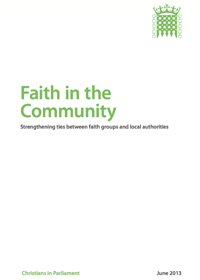New Report Highlights Relationship Between Faith Groups and Local Authorities
Local authorities have expressed how vital faith organisations are - as well as outlining areas for improvement
In a new Evangelical Alliance report, Faith in the Community, produced for Christians in Parliament, 155 local authorities responded to a survey asking about their interaction with faith groups.
'From the 155 responses it was clear that the engagement between churches and local authorities is fruitful and delivering much-needed support for our communities', noted the report's executive summary.
Though the report found that range of services that faith groups provide is vast, debt crisis agencies, street pastors and foodbanks were the most readily recognised by councils. Abandoned services such as libraries and post offices were sometimes taken over by churches.

Local authorities commended the value of faith groups being deeply rooted in their communities, and that they can be trusted to deliver vital work.
The fact that they are faith groups, rather than just a collection of volunteers, matters too, with local authorities recognising that their beliefs motivate Christians to act for the good of their communities.
But there's room for improvement. Some authorities were unaware of any work being done by faith groups. When asked to estimate the percentage of the voluntary and community sector work carried out by faith groups, those estimates varied between one and 70 per cent.
There are also myths about working in partnership, which made some local authorities hesitant to work with faith groups. But it appears that misunderstandings of faith groups could be rectified through training.
There were also indications that the bureaucratic hurdles some groups have to jump through to partner with their council are a big turn off, and this can undermine the benefits faith groups offer.
The report was commissioned following last year's Clearing the Ground report about the freedom of Christians in the UK. One of the finds of that report was that there is widespread illiteracy in many public institutions.
Gary Streeter, Conservative MP for South West Devon, chair of Christians in Parliament, which commissioned the report, said the Faith in the Community report demonstrates the 'vibrant and essential work' of faith groups.
With local authorities having less money and more demands in the years to come, both local and national government 'need to pay attention and move on from warm platitudes to supporting practical partnerships that will make a difference to all of our neighbourhoods,' Mr Streeter said.
'Faith groups are not here to plug a gap, or pretend to be part of the state, but they are vital to the life of our communities,' he continued.
'Churches and other groups stand on the side of the poorest and most vulnerable, they get started before funding bids are accepted, and they stick around after they are cancelled.'
Dr Dave Landrum, director of advocacy at the Evangelical Alliance, said, 'Local authorities and churches clearly take seriously their responsibility to serve their communities. This report shows that despite obstacles it is possible to work together for the good of all - indeed it shows that many of the things that limit partnership are more based on perception than reality. These myths need to be exposed and the report shows that partnership is not only possible but preferable.
'Christians are already doing a huge amount of great work in every city, town and village across the UK. The sheer depth and scope of that work is astonishing and I hope this report will encourage an increase in this essential work in the years ahead.
'There is a perceived fear within parts of the public sector, public and media that faith groups will seek to use public sector funded service delivery as a means of increasing the number of followers of that faith group and/or seek to discriminate on the basis of a users' faith.'